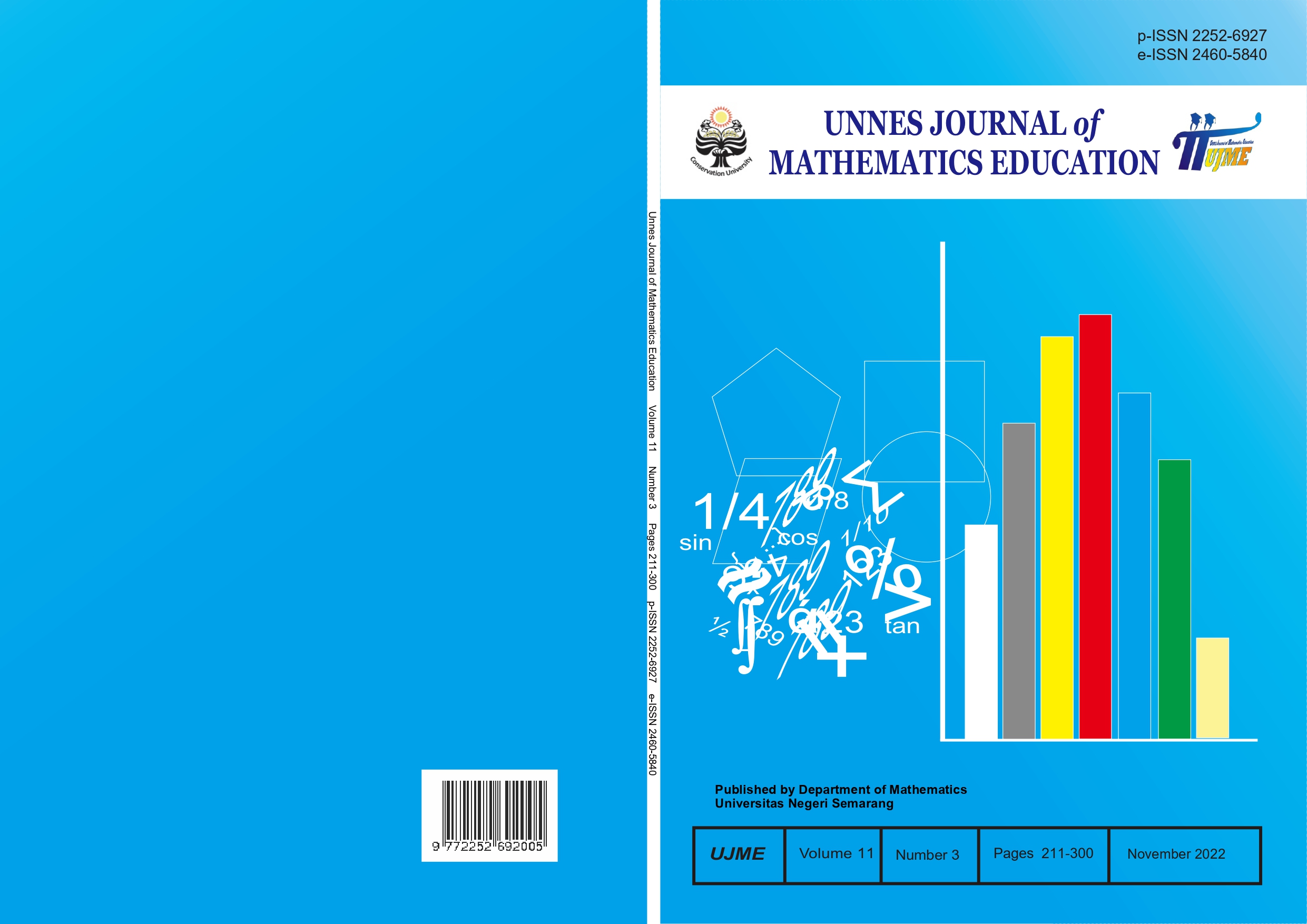Mathematical Literacy in Terms of Cognitive Style With Pendidikan Matematika Realistik Indonesia Learning Assisted by Google Classroom
##plugins.themes.academic_pro.article.main##
Abstract
This study aims to (1) find out the difference in the mean increase in students' mathematical literacy with Pendidikan Matematika Realistik Indonesia learning assisted by Google Classroom (PMRI-GC learning) and with Scientific learning, and (2) find out the effect of cognitive style on students' mathematical literacy with PMRI-GC learning. The design in this study was experimental designs: true experimental design: pretest-posttest control group design. The population in this study were students of class VIII SMP N 2 Wedi. The samples were determined by random sampling technique and determined that class VIIIA as the experimental class was given PMRI-GC learning and class VIIIB as the control class was given Scientific learning. The results of the study were the mean increase of students' mathematical literacy with PMRI-GC learning is better than students with scientific learning, the mean increase of students' mathematical literacy with PMRI-GC learning is in the medium category, while the mean increase of students' mathematical literacy with Scientific learning is in the low category, and there is an effect of cognitive style on mathematical literacy of students who receive PMRI-GC learning, with an effect of , meaning that cognitive style has an effect of on mathematical literacy.
##plugins.themes.academic_pro.article.details##
References
Faujiah, E., Banindra, C., & Oktaviana, E. (2020). Survei Literasi Matematika Siswa pada Materi Volume Kubus dan Balok Menggunakan Google Classroom (Survey of students’ Mathematical Literacy on the Volume of Cubes and Blocks Using Google Classroom). In Prosiding Seminar Nasional Pendidikan STKIP KUSUMA Negara II/Proceeding National Seminar of Education in STKIP Kusuma Negara II (pp. 281-290). Jakarta.
Herliani, E. F. & Wardono. (2019). Perlunya Kemampuan Literasi Matematika Ditinjau Dari Gaya Kognitif dalam Pembelajaran Realistic Mathematics Education (RME) (The Need for Mathematical Literacy Ability in Terms of Cognitive Style in Realistic Mathematics Education (RME) Learning). Proceeding National Seminar of Mathematics 2 (pp. 234-238). Semarang.
Mahdiansyah & Rahmawati. (2014). Literasi Matematika Siswa Jenjang Pendidikan Menegah: Analisis Menggunakan Desain Tes Internasional dengan Konteks Indonesia (Mathematical Literacy for Secondary Education Students: Analiysis Using an International Test Design with an Indonesian Context). Jurnal Pendidikan dan Kebudayaan, 20(4), 452-469.
Organization for Economic Cooperation and Development. (2014). PISA 2012 Results : What Students Know and Can Do – Students Performance in Mathematics, Reading and Science (Volume I, Revised Edition, February 2014). (Report Study of Students’ Literacy). PISA OECD Publishing.
Organization for Economic Cooperation and Development. (2016). PISA 2015 Results (Volume I): Excellence and Equality in Education In Focus. OECD Publishing.
Organization for Economic Cooperation and Development. (2019a). PISA 2018 Results (Volume I): What Students Know and Can Do. OECD Publishing.
Organization for Economic Cooperation and Development. (2019b). PISA 2018 Assesment and Analytical Framework. OECD Publishing.
Purnomo, R. A. (2016). Analisis Statistik Ekonomi dan Bisnis dengan SPSS: untuk Mahasiswa, Dosen, dan Praktisi (Economic and Business Statistical Analysis with SPSS: for Students, Lecturers, and Practitioners). CV. WADE Group.
Rahayu, D. U., Mulyono, & Cahyono, A. N. (2020). Kemampuan Literasi Matematika Ditinjau dari Gaya Kognitif Siswa pada Model PBL Berbantuan LMS (Mathematical Literacy Ability in Terms of Cognitive Style on PBL Model Assisted by LMS). In Prosiding Seminar Nasional Pascasarjana 2020/Proceeding National Seminar of Postgraduate 2020 (pp. 715-720). Semarang.
Rahman, A. A. (2018). Strategi Belajar Mengajar Matematika (Mathematichs Teaching and Learning Strategies). Syiah Kuala University Press.
Rosita, A., Wardono, & Kartono. (2018). Discovery Learning-PMRI in Improving Mathematics Literacy of Junior High School Students. Unnes Journal of Mathematics Education Research, 7(1), 35-39.
Sugiyono. 2016. Metode Penelitian Pendidikan – Pendekatan Kualitatif, Kualitatif, dan R&D (Educational Research Methods – Qualitative, Qualitative, and R&D Approaches). Alfabeta.
Wardono. 2017. Statistika Penelitian Pendidikan (Educational Research Statistics). FMIPA UNNES Press.
Wardono, Waluyo, S. B., Kartono, Mulyono, & Mariani, S. (2018a). Development of Innovative Problem Based Learning Model with PMRI-Scientific Approach Using ICT to Increase Mathematics Literacy and Independence-Character od Junior High School Students. Journal of Physics: Conference Series, 983(1), 1-9.
Wardono & Mariani, S. (2019). Problem Based Learning with Indonesian Realistic Mathematics Education Approach Assisted E-Schoology to Improve Student Mathematization. Journal of Physics: Conference Series, 1321 (3), 1-7.
Wijaya, A. P. (2016). Gaya Kognitif Field Dependent dan Tingkat Pemahaman Konsep Matematis antara Pembelajaran Langsung dan STAD (Field Dependent Cognitive Style and Level of Understanding of Mathematics Concepts Between Direct Learning and STAD). Jurnal Derivat, 3(2), 1-16.
